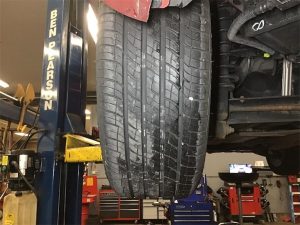Why do my tires keep losing air?
[caption id="attachment_8249" align="alignright" width="550"] Good tread means good traction and contact with the road.[/caption]
When tires keep losing air, it can be super frustrating—especially if there aren't any obvious culprits like a puncture or tear. Before you shell out a few hundred dollars to get your tires replaced, here are a few things to consider.
Good tread means good traction and contact with the road.[/caption]
When tires keep losing air, it can be super frustrating—especially if there aren't any obvious culprits like a puncture or tear. Before you shell out a few hundred dollars to get your tires replaced, here are a few things to consider.

 Good tread means good traction and contact with the road.[/caption]
When tires keep losing air, it can be super frustrating—especially if there aren't any obvious culprits like a puncture or tear. Before you shell out a few hundred dollars to get your tires replaced, here are a few things to consider.
Good tread means good traction and contact with the road.[/caption]
When tires keep losing air, it can be super frustrating—especially if there aren't any obvious culprits like a puncture or tear. Before you shell out a few hundred dollars to get your tires replaced, here are a few things to consider.
Temperature Changes
Sudden drops or rises in temperature can cause your tire pressure to fluctuate pretty dramatically—typically, one to two pounds (psi) for every 10 degrees in temperature change. So, theoretically, your tires could lose 4 PSI if the temperature drops by 20℉ over a brisk autumn weekend. Conversely, the PSI reading may be misleading after a several-day summer heat wave. And if you're tires are old or worn, they'll be particularly vulnerable to these fluctuations. Before getting a replacement, you should try inflating your tire to the proper psi as listed in your drivers' manual, or on the inside of your drivers' side door and monitor it for about a week. If the pressure stays the same, you're likely in the clear! If your tires are still losing air, there are two technical problems to consider: valve stem failure and mounting problems.Valve Stems
The valve stem is the mechanism that allows you to put air in a tire. Because it sticks out of the tire and is exposed to the elements, it can crack and deteriorate or become damaged in severe weather. If this happens, it breaks the seal of the tire's inner tube causing air to slowly and constantly leak out of the tire.Rim Damage
Air can also escape is at the wheel rim, where the tire and wheel meet. If the rim becomes dented when you hit a pothole or skim the curb, or simply becomes rusty over time, it can create a misalignment between the tire and the rim. Maintaining a firm seal between these two components is very important—if damaged it can cause the tires to leak slowly.
